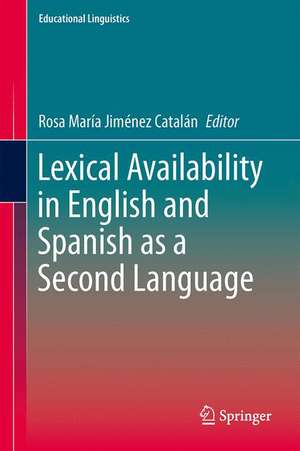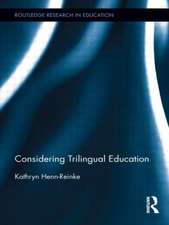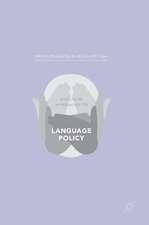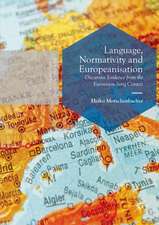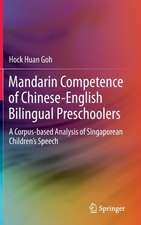Lexical Availability in English and Spanish as a Second Language: Educational Linguistics, cartea 17
Editat de Rosa María Jiménez Catalánen Limba Engleză Hardback – 17 sep 2013
| Toate formatele și edițiile | Preț | Express |
|---|---|---|
| Paperback (1) | 636.63 lei 43-57 zile | |
| SPRINGER NETHERLANDS – 27 aug 2016 | 636.63 lei 43-57 zile | |
| Hardback (1) | 642.83 lei 43-57 zile | |
| SPRINGER NETHERLANDS – 17 sep 2013 | 642.83 lei 43-57 zile |
Din seria Educational Linguistics
- 18%
 Preț: 959.98 lei
Preț: 959.98 lei - 15%
 Preț: 644.95 lei
Preț: 644.95 lei - 20%
 Preț: 495.50 lei
Preț: 495.50 lei - 18%
 Preț: 952.26 lei
Preț: 952.26 lei - 15%
 Preț: 649.87 lei
Preț: 649.87 lei - 18%
 Preț: 888.18 lei
Preț: 888.18 lei - 15%
 Preț: 644.95 lei
Preț: 644.95 lei - 15%
 Preț: 636.80 lei
Preț: 636.80 lei - 15%
 Preț: 634.49 lei
Preț: 634.49 lei - 20%
 Preț: 555.53 lei
Preț: 555.53 lei - 18%
 Preț: 940.72 lei
Preț: 940.72 lei - 20%
 Preț: 563.98 lei
Preț: 563.98 lei - 15%
 Preț: 638.57 lei
Preț: 638.57 lei - 20%
 Preț: 568.44 lei
Preț: 568.44 lei - 15%
 Preț: 643.48 lei
Preț: 643.48 lei - 18%
 Preț: 899.52 lei
Preț: 899.52 lei - 15%
 Preț: 638.76 lei
Preț: 638.76 lei - 15%
 Preț: 649.06 lei
Preț: 649.06 lei - 15%
 Preț: 643.65 lei
Preț: 643.65 lei -
 Preț: 390.08 lei
Preț: 390.08 lei - 15%
 Preț: 645.28 lei
Preț: 645.28 lei -
 Preț: 393.52 lei
Preț: 393.52 lei - 15%
 Preț: 649.39 lei
Preț: 649.39 lei -
 Preț: 392.75 lei
Preț: 392.75 lei - 18%
 Preț: 897.65 lei
Preț: 897.65 lei -
 Preț: 393.13 lei
Preț: 393.13 lei - 18%
 Preț: 728.28 lei
Preț: 728.28 lei - 15%
 Preț: 638.43 lei
Preț: 638.43 lei - 18%
 Preț: 1113.39 lei
Preț: 1113.39 lei
Preț: 642.83 lei
Preț vechi: 756.27 lei
-15% Nou
Puncte Express: 964
Preț estimativ în valută:
123.04€ • 133.70$ • 103.42£
123.04€ • 133.70$ • 103.42£
Carte tipărită la comandă
Livrare economică 21 aprilie-05 mai
Preluare comenzi: 021 569.72.76
Specificații
ISBN-13: 9789400771574
ISBN-10: 9400771576
Pagini: 230
Ilustrații: XIV, 205 p. 25 illus., 14 illus. in color.
Dimensiuni: 155 x 235 x 20 mm
Greutate: 0.49 kg
Ediția:2014
Editura: SPRINGER NETHERLANDS
Colecția Springer
Seria Educational Linguistics
Locul publicării:Dordrecht, Netherlands
ISBN-10: 9400771576
Pagini: 230
Ilustrații: XIV, 205 p. 25 illus., 14 illus. in color.
Dimensiuni: 155 x 235 x 20 mm
Greutate: 0.49 kg
Ediția:2014
Editura: SPRINGER NETHERLANDS
Colecția Springer
Seria Educational Linguistics
Locul publicării:Dordrecht, Netherlands
Public țintă
ResearchCuprins
Preface .- 1. Lexical Availability Studies .- Part I . 2. Lexical Availability of Basic and Advanced Semantic Categories in English L1 and English L2 .- 3. The Effect of Age on EFL Learners’ Lexical Availability: Word Responses to the Cue Words ‘Town’ and ‘Countryside’ .- 4. The Incidence of Previous Foreign Language Contact in a Lexical Availability Task. A Study of Senior Learners .- 5. Lexical Variation in Learners’ Responses to Cue Words: The Effect of Gender .- 6. Frequency Profiles of EFL Learners’ Lexical Availability .- Part II . 7. The Relationship of Language Proficiency to the Lexical Availability of Learners of Spanish .- 8. Slovene Students’ Lexical Availability in English and Spanish .- 9. The Effect of Instruction on Polish Spanish Learners’ Lexical Availability .- 10. Cognitive Factors of Lexical Availability in a Second Language .- Conclusion .- 11. Researching Lexical Availability in L2: some Methodological Issues.
Recenzii
“It focuses on lexical availability, a common concern of English and Spanish applied linguists nowadays. … a single volume or a collection of articles on lexical availability was not available in the market prior to the appearance of this volume. Therefore, this single volume would serve a newcomer to the field. … the book is not only recommended to Spanish and English FL teachers and researchers, but also to those researchers who know other under-investigated languages.” (Is’haaq Akbarian, IJES International Journal of English Studies, Vol. 15 (2), 2015)
“The studies presented in this volume offer the reader findings and insights from studies conducted among learners with different mother tongues, who are learning English or Spanish as their second or third language in different countries … . the authors suggest some of the innovations that couldbe interesting for further studies and disciplines, such as psycholinguistics or vocabulary testing, from which the results of lexical availability investigations could be studied.” (Felipe Jiménez Berrio, Spanish in Context, Vol. 12 (1), 2015)
“This book compiles two different research areas: lexical availability studies, and vocabulary research in second or foreign languages. … it offers an excellent (English-language) resource for any researcher/ teacher wanting to know more about the lexical availability of his/her learners’ receptive and productive lexical competence. … I consider the volume a fascinating resource and one that offers immense potential in exploring lexical availability either in isolation or in combination with vocabulary tests.” (Jonathan Clenton, The Linguist List, February, 2014)
“The studies presented in this volume offer the reader findings and insights from studies conducted among learners with different mother tongues, who are learning English or Spanish as their second or third language in different countries … . the authors suggest some of the innovations that couldbe interesting for further studies and disciplines, such as psycholinguistics or vocabulary testing, from which the results of lexical availability investigations could be studied.” (Felipe Jiménez Berrio, Spanish in Context, Vol. 12 (1), 2015)
“This book compiles two different research areas: lexical availability studies, and vocabulary research in second or foreign languages. … it offers an excellent (English-language) resource for any researcher/ teacher wanting to know more about the lexical availability of his/her learners’ receptive and productive lexical competence. … I consider the volume a fascinating resource and one that offers immense potential in exploring lexical availability either in isolation or in combination with vocabulary tests.” (Jonathan Clenton, The Linguist List, February, 2014)
Textul de pe ultima copertă
This volume contributes to the research in two different research areas: lexical availability studies and vocabulary research in second or foreign languages. Lexical availability is defined as the words that immediately come to mind as a response to a stimulus provided by topics related to domains closely connected to daily life: for instance animals, food and drink, daily activities, politics, or poverty. Lexical availability is a dimension of learners’ receptive and productive lexical competence, and, consequently, an important variable of learners’ communicative competence. Written by leading researchers in Spanish and English applied linguistics, the studies presented in this volume offer the reader findings and insights from studies conducted in learners with different mother tongues, who learn English or Spanish as their second or third language.
“This book made me aware of an approach to vocabulary acquisition which has a long tradition in European research, but has been somewhat neglected by English-speaking researchers. The methodology was pioneered in France where it developed into the Francais Fondamental project - an influential approach to the vocabulary needs of learners of French. It was also taken up by Spanish researchers, and more recently developed by the team at La Rioja University.
Where English-language research has focused on the frequency of words in large corpora and the implications of this feature for L2 vocabulary acquisition, the lexical availability tradition takes a much more learner-centred approach to L2 vocabulary skills, directly reflecting learners' needs and learners' ability to do things with small, effective vocabularies. This leads to a set of research priorities that look refreshingly different from the ones we are used to.
Read this book. It might change the way you think about vocabulary research.” Paul Meara, Swansea University, Wales, UK
“This book made me aware of an approach to vocabulary acquisition which has a long tradition in European research, but has been somewhat neglected by English-speaking researchers. The methodology was pioneered in France where it developed into the Francais Fondamental project - an influential approach to the vocabulary needs of learners of French. It was also taken up by Spanish researchers, and more recently developed by the team at La Rioja University.
Where English-language research has focused on the frequency of words in large corpora and the implications of this feature for L2 vocabulary acquisition, the lexical availability tradition takes a much more learner-centred approach to L2 vocabulary skills, directly reflecting learners' needs and learners' ability to do things with small, effective vocabularies. This leads to a set of research priorities that look refreshingly different from the ones we are used to.
Read this book. It might change the way you think about vocabulary research.” Paul Meara, Swansea University, Wales, UK
Caracteristici
A timely volume on lexical availability in learners of English or Spanish as a second or third language Integrates studies on lexical availability in two of the world's most widely spoken languages Using original data from learners of English or Spanish in Chile, Great Britain, Poland, Slovenia, and Spain
